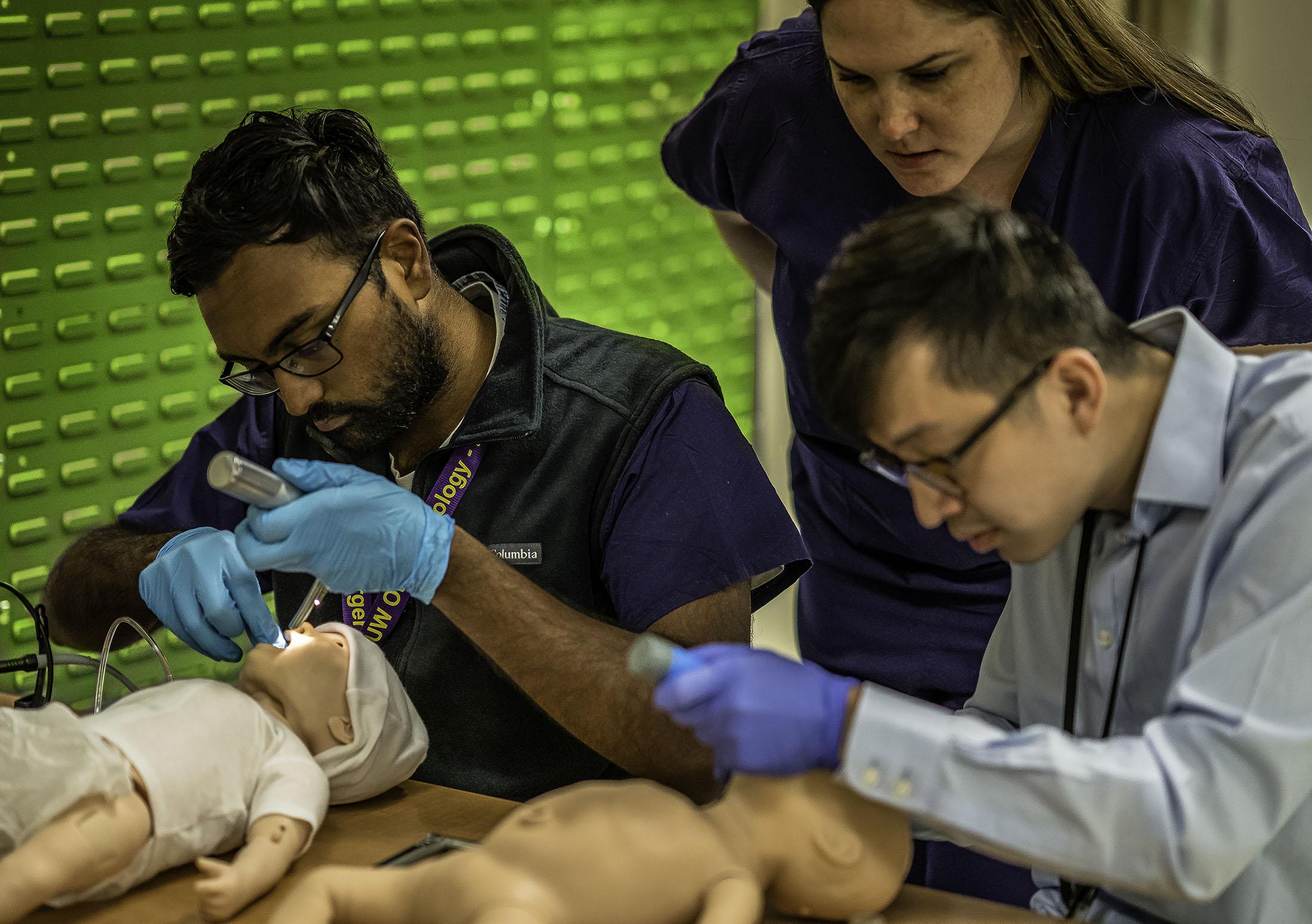Exploring the Field of Otolaryngology: What to Expect When You Speak With an ENT
Otolaryngology, generally described as ENT, includes the diagnosis and therapy of ear, throat, and nose disorders. For those experiencing relevant problems, seeking advice from an ENT expert can provide quality and alleviation. Comprehending what to expect throughout such examinations is vital for effective interaction and care. This overview will certainly describe key facets of the ENT experience, including typical reasons for visits and the processes involved in diagnosis and treatment.

Understanding Otolaryngology: A Review
Otolaryngology, often referred to as ENT (Throat, nose, and ear) medication, is a specialized branch of medicine that concentrates on the diagnosis and treatment of conditions impacting these vital locations of the body. This area incorporates a wide variety of problems, consisting of those pertaining to hearing, equilibrium, respiratory system feature, and speech. Otolaryngologists are educated to take care of both clinical and medical treatments, using sophisticated methods and innovations. Their expertise expands past standard conditions, attending to problems such as allergies, sinus infections, and hearing loss. In addition, they play a critical duty in the monitoring of head and neck cancers, offering thorough treatment customized to private client needs. In general, otolaryngology remains important for maintaining wellness and lifestyle in damaged individuals.
Typical Factors to See an ENT Expert
Numerous people look for the competence of an ENT professional for a variety of reasons, reflecting the diverse nature of conditions that affect the ear, nose, and throat. Typical concerns consist of persistent sinus problems, which often results in consistent nasal blockage and face discomfort. Allergic reactions and their linked symptoms, such as sneezing and itching, also trigger check outs to these experts (Otolaryngology). Hearing loss, whether sudden or gradual, is another significant reason for assessment. On top of that, individuals may seek assessment for throat disorders, consisting of persistent hoarseness or swallowing problems. Sleep apnea, characterized by disrupted breathing during rest, is regularly attended to by ENT experts also. Each of these problems highlights the value of specialized care in managing intricate ENT-related wellness problems
Preparing for Your ENT Consultation
When planning for an ENT visit, it is important to collect pertinent info and consider any kind of certain issues. People must compile a detailed case history, consisting of previous ear, nose, or throat problems, surgical procedures, and present medications. Recording symptoms-- such as period, seriousness, and regularity-- can offer useful insights for the ENT professional. Additionally, individuals need to prepare a list of concerns they desire to ask, making sure that all concerns are dealt with throughout the see. Bringing along any type of pertinent clinical records or test outcomes can better assist the ENT in comprehending the person's condition. Patients should verify their visit details, consisting of date, time, and area, to decrease any last-minute complication. Correct prep work can boost the effectiveness of the assessment and cause much better results.
What to Anticipate During the Assessment
As the examination begins, the client can expect to take part in a complete conversation with the ENT expert about their symptoms and clinical background. The expert will inquire concerning the period, regularity, and intensity of signs such as hearing loss, nasal congestion, or sore throat. Additionally, the person's previous clinical conditions, medications, and any kind of appropriate household history will certainly be examined, aiding the professional in developing a complete understanding of the patient's wellness. The ENT may also inquire about way of life factors, such as direct exposure adenoids removal nhs to irritants or irritants. This open dialogue develops a foundation for the consultation, ensuring that the client's issues are resolved and setting the phase for any type of necessary analyses or suggestions for therapy.
Diagnostic Tests and Treatments in Otolaryngology
A variety of analysis tests and treatments are important in otolaryngology to properly assess and detect conditions impacting the ear, throat, and nose. Usual tests include audiometry, which gauges hearing function, and tympanometry, examining center ear pressure. Nasal endoscopy allows visualization of the nasal passages and sinuses, while laryngoscopy takes a look at the throat and singing cords. Imaging methods, such as CT scans and MRIs, give comprehensive sights of head and neck frameworks. Allergic reaction testing might additionally be conducted to determine triggers for sinus or respiratory system issues. These diagnostic devices make it possible for ENT specialists to establish a comprehensive understanding of individuals' problems, guaranteeing tailored and reliable monitoring plans. Proper diagnosis is crucial for successful treatment outcomes in otolaryngology.
Treatment Choices Used by ENT Specialists
ENT specialists provide a range of therapy alternatives customized to address specific conditions affecting the ear, nose, and throat. These treatments range from conservative approaches, such as medication and lifestyle modifications, to more intrusive treatments. Allergies may be managed with antihistamines or immunotherapy, while persistent sinus problems may need nasal corticosteroids or sinus surgical treatment. For hearing loss, ENT experts typically recommend listening device or medical treatments like cochlear implants. In situations of throat conditions, options can consist of speech treatment or surgeries to eliminate obstructions. Additionally, they might supply assistance for managing rest apnea, including the use of CPAP tools or medical interventions. Overall, the objective is to enhance patients' lifestyle via individualized treatment and efficient therapy approaches.
When to Seek Follow-Up Treatment With an ENT
Recognizing when to look for follow-up care with an ENT professional is important for taking care of continuous symptoms or difficulties connected to throat, nose, and ear conditions. Clients must consider arranging a follow-up consultation if symptoms continue regardless of initial treatment, such as persistent ear discomfort, nasal congestion, or throat discomfort. Modifications in hearing, equilibrium issues, or unusual nasal discharge might also require more evaluation. Furthermore, read here if a person experiences side effects from recommended drugs or has undergone a medical treatment, follow-up treatment is very important to keep track of healing and resolve any issues. Timely appointments can ensure reliable management of conditions, avoid prospective issues, and give tranquility of mind concerning one's health and wellness. Looking for follow-up treatment promotes positive health and wellness administration in otolaryngology.
Often Asked Concerns

What Credentials Should I Try to find in an ENT Specialist?
When seeking an ENT specialist, one ought to look for board accreditation, pertinent experience, and strong person reviews. In addition, effective communication abilities and a compassionate strategy can greatly improve the overall treatment experience.
Just how Do I Choose the Right ENT for My Requirements?
Picking the right ENT expert entails evaluating their certifications, experience, and patient reviews (Otolaryngology). It is necessary to contemplate their communication design and strategy to therapy, ensuring they align with the individual's certain wellness needs and choices
Exist Any Type Of Threats Associated With ENT Procedures?
The threats linked with ENT procedures may include infection, bleeding, anesthesia problems, and prospective damages to surrounding structures. Individuals must review these threats with their physician to understand individual concerns and guarantee informed decisions.
How Can I Manage Anxiety Before My ENT Appointment?
To take care of anxiousness prior to an appointment, people can exercise deep breathing workouts, picture positive results, prepare questions in advancement, and seek support from pals or household, cultivating a feeling of peace of mind and calmness.
What Should I Do if I Experience Side Effects From Treatment?
If negative effects from therapy take place, the person must immediately report them to their doctor. Adjustments to therapy or extra interventions may be essential to guarantee security and efficiency in managing their problem - Hearing. As the appointment starts, the client can anticipate other to engage in an extensive discussion with the ENT specialist regarding their symptoms and clinical history. These analysis devices allow ENT specialists to create an extensive understanding of clients' problems, guaranteeing customized and efficient monitoring plans. ENT professionals use a variety of treatment options customized to address certain conditions impacting the throat, ear, and nose. When seeking an ENT professional, one should look for board qualification, appropriate experience, and solid patient testimonials. Choosing the appropriate ENT specialist includes evaluating their credentials, experience, and patient evaluations